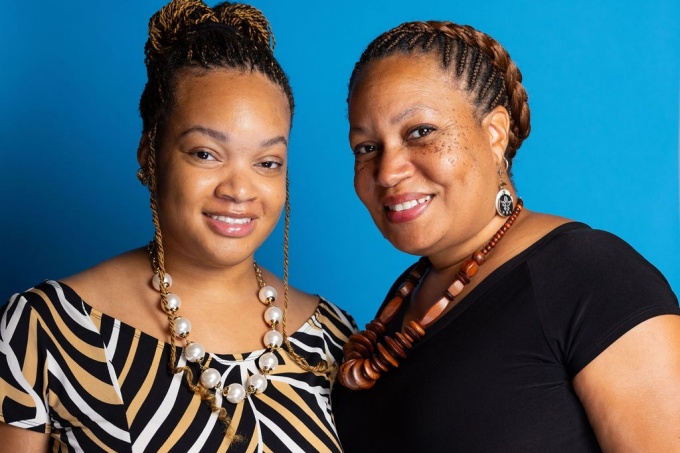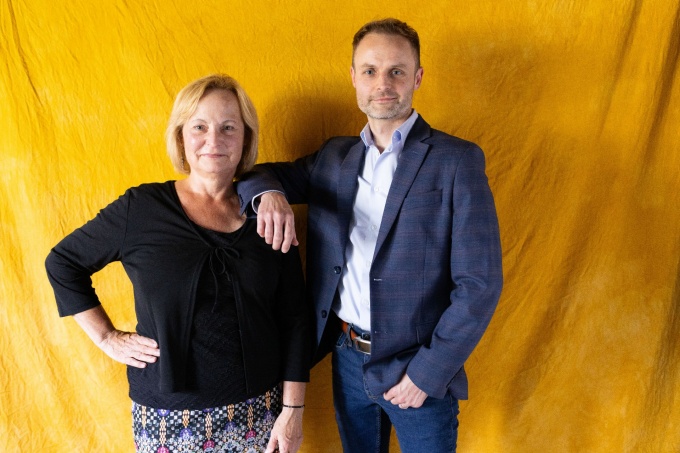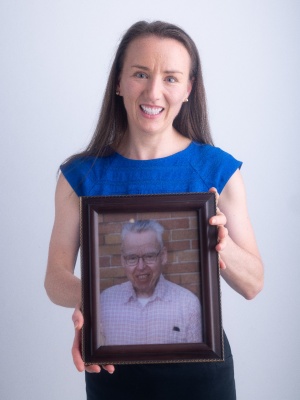All in the family
After 90 years, many families have multiple generations of UB School of Social Work alumni

La Shawn Davis, MSW ’02, at right, with her daughter, Deja Middlebrook, JD ’21, MSW ’20, BA ’17. Photos: Stephen Gabris.
By Matthew Biddle
Our alumni understand the value of a UB education better than anyone else.
Many can point to particular classes, professors or experiences that set them on their career path and continue to positively influence them today. Perhaps it’s no surprise, then, that among the school’s 8,000-plus alumni, you’ll find many families with multiple School of Social Work grads. Here are just a few of their stories.
Having her first child, Deja, inspired La Shawn Davis, MSW ’02, to go back to school to earn her master’s degree. Davis wanted to demonstrate what was possible for Deja’s future and to pursue her own career ambitions in the mental health space.
After graduation, Davis worked for an assertive community treatment program and as a chemical abuse addiction counselor before joining the City of Buffalo, where she’s been a youth counselor for the past 14 years.
“I love working all over the city with Buffalo Public Schools, charter schools and directly with families,” Davis says. “Every summer, we can get up to 100 kids for our leadership program, and during the school year, I work with kids in the juvenile justice system, kids who may have lost a parent.”
And what about the little girl Davis occasionally brought with her to class at UB? She’s an alumna now, too: Deja Middlebrook, JD ’21, MSW ’20, BA ’17.
— Deja Middlebrook, JD ’21, MSW ’20, BA ’17, Inclusionary Compliance Officer at the City of Buffalo and Co-Owner of Walking Through Solutions
With three UB degrees in hand, Middlebrook joined Buffalo Mayor Byron W. Brown’s Office in 2022 as inclusionary compliance officer, charged with developing and enforcing diversity and inclusion policies to create opportunities for women- and minority-owned business enterprises.
“I didn’t expect to work with small businesses,” Middlebrook says, “but I love doing it because it’s this great intersection of race, class and gender, and brings together my social work and law hats in a cool way.”
If working together at City Hall wasn’t enough, Davis and Middlebrook are also business partners. Davis founded Walking Through Solutions in 2022 to work with parents and families. After the racist attack at Tops, Davis sprang into action, providing free counseling support in East Buffalo. When she saw the community outcry for clinicians of color, Middlebrook came on board to help fill the gap.
Today, they offer one-on-one counseling, couples and family therapy, and group training for organizations. Middlebrook created a relationship boot camp that introduces clients to the idea of therapy and covers such topics as vulnerability, intimacy, conflict resolution and childhood trauma. In addition, Walking Through Solutions is part of the BestSelf Black Mental Health Response Team serving East Buffalo.
The School of Social Work has recognized both Davis and Middlebrook with Distinguished Alumni Awards for their contributions to the field.
“Black clinicians have value in these spaces that was not always recognized,” Middlebrook says. “Through our business, we have the autonomy to create programs and respond as needs in the community arise.”
Davis agrees: “We want to change people’s mindset around mental health, especially people of color, and help build stronger families and communities. We’re a really good team.”
Joanne Wilton, MSW ’90, credits her cousin with inspiring her to pursue social work: the late Don Schoenl, who earned a BA from UB in 1967 and worked for the Erie County Department of Social Services.
“He did home visits and often came to my house for lunch,” she remembers. “He would talk to my mother about issues he dealt with, and it always sounded like he was really making a difference for people. I knew from the time I was young that I wanted to do something like that.”
As an adult, Wilton worked in the field for a decade before joining UB’s part-time MSW program. She recalls being pushed out of her comfort zone with a field placement at Gowanda State Hospital and learning solution-focused therapy from her Interventions instructor, Margaret Manzella.
Later, Wilton employed the solution-focused model as a social worker at Cheektowaga-Sloan schools, where she created the Family Solutions Center. The center, which helps families recognize and use their strengths to overcome obstacles, saw its first client 20 years ago and is still going strong today.
“When I retired, we’d had about 125 UB interns,” says Wilton, who retired in 2021 but still consults for the center. “I love mentoring young social workers; it truly became one of my favorite parts of the job. It was a way to help them get started, while also keeping me on my toes. The first time I heard anything about trauma-informed practice was from a UB intern.”

Joanne Wilton, MSW ’90, with her son, Andrew Wilton, MSW ’12, BA ’10.
Andrew Wilton, MSW ’12, BA ’10, was about 2 years old when his mom graduated from UB.
“I remember going with her to the therapeutic preschool she worked at and experiencing that environment. She also brought a lot of influential people into my life, and I’d hear all these stories around the kitchen table about change that was happening and important work people were doing,” he says.
He, too, pursued an MSW at UB, where he met his wife, Amanda Wilton, MSW ’12, during their foundation year. The couple now have a 5-year-old daughter and run separate clinical practices: Amanda is a wellness and life coach, and Andrew is an integrative psychotherapist. He started his business while teaching at Daemen University and went full time last year with the increased demand for telehealth.
“It’s important in therapy to view the people we meet as whole people, not a set of problems that we contextualize within a rigid model,” Andrew says of his practice focus. “It’s about understanding people holistically and understanding where the evidence points, both in terms of recent research and time-tested wisdom in our field.”
The Wiltons agree that working in the same field adds an extra dimension to their relationship.
“What we do is more of a vocation than a profession, and it reflects our beliefs and values,” Joanne says. “I’ve always had this sense — but even more so as Andrew’s gotten older — that he gets me and I get him. It’s a point of pride to me that he decided to pursue this field.”

MSW student Kathleen Riley holds a picture of her late father, Robert J. Riley, MSW ’68, BS ’55
MSW student Kathleen Riley had been teaching for 17 years when she took a leave of absence to help care for her father, Robert J. Riley, MSW ’68, BS ’55, as he approached the end of his life. When he passed in November 2021, she was able to take the time she needed, both to grieve and to take stock of her own journey.
“Grief can often invite us to do that self-work,” Riley says. “I am a huge proponent of bringing to light what healing can look like, and how that can mean different things for different people.”
The experience inspired her to pivot in her career and pursue social work like her father, who worked for the Erie County Department of Social Services for 28 years, serving those struggling with homelessness, mental illness and addiction.
“He was very justice-minded, and his Roman Catholic faith was core to who he was, so he was always welcoming and lived with compassion,” Riley says. “He would advocate for clients to the point where it put him in danger of losing his job on several occasions.”
Active in the Civil Rights Movement and the Peace Movement during the Vietnam War, Robert was a member of the Congress of Racial Equality and the WNY Peace Center. He dove headlong into causes he cared about, no matter how sweeping or minor the issue. A lifelong resident of Buffalo’s Lovejoy neighborhood, he fought to have curbs and stop signs installed, pavement fixed and to keep the local fire station open.
“When he retired, he didn’t stop any of his advocacy or community organizing,” Riley says. “He would pack a lunch and go with someone to their court date or accompany someone to an appointment. Five months before he died, he had me calling housing advocacy for a neighbor because of lead paint.”
— Kathleen Riley, MSW Student
Clearly, Robert’s commitment to justice has rubbed off on his daughter. When the COVID-19 vaccine came out and shots were scarce, Riley helped over 100 elderly neighbors find appointments. Right now, she’s organizing her community to “contest and make noise” about dynamic staffing in the Buffalo Fire Department, a model that allows the city to close firehouses temporarily due to staff shortages, thereby increasing emergency response times.
Toward the end of last year, one of her instructors, Elaine Hammond, MSW ’02, even asked her, “Is there anything you’re not passionate about?”
After graduation next year, Riley envisions herself working in a clinical setting, but is open to whatever path her career takes.
“The arc of my father’s whole life was an invitation toward social work,” she says. “It’s helped me understand that, even now with all the demands of my life, there are always ways we can be advocating for others. We all have the capacity to ask hard questions of ourselves and to contribute to the arc of justice in this world.”